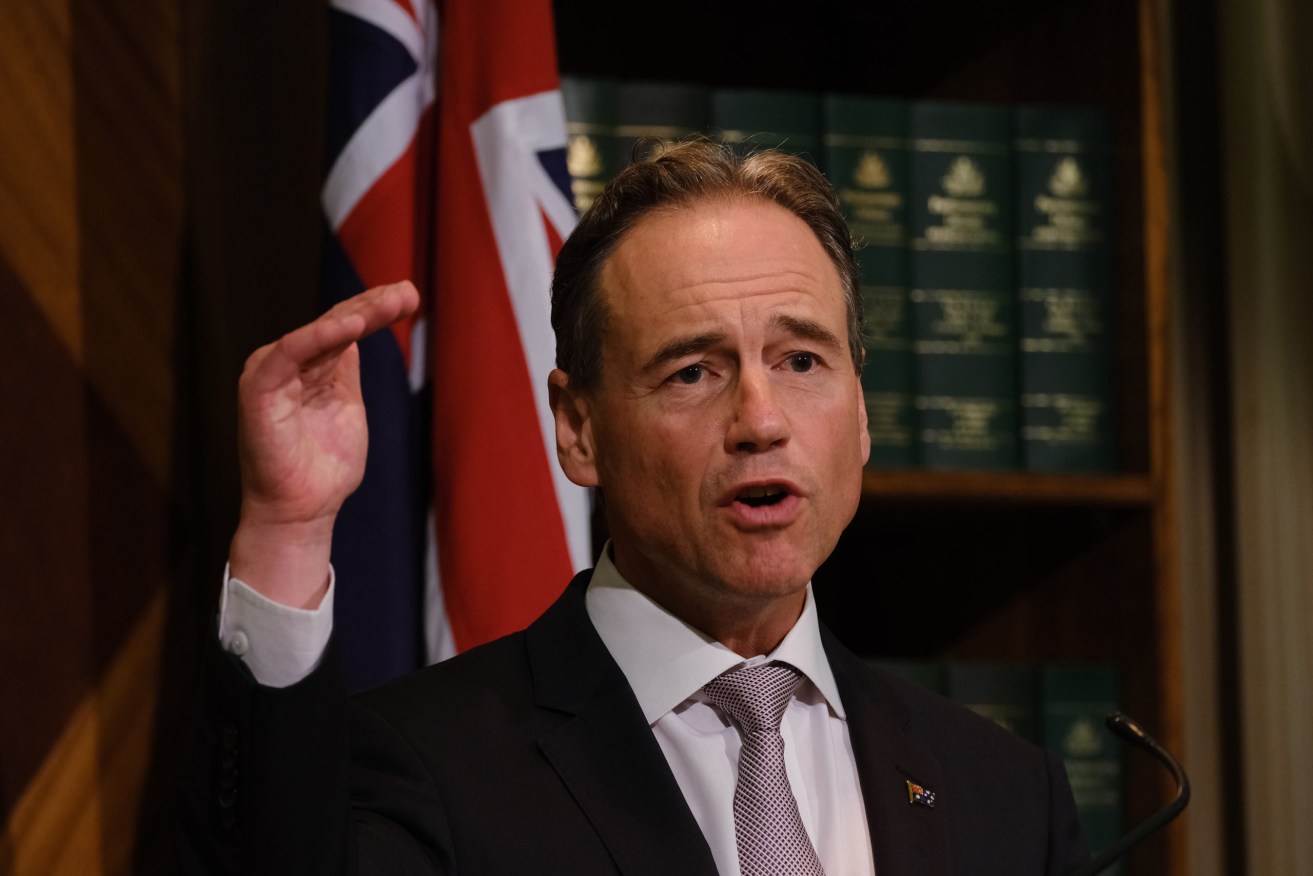As confidence plunges, govt pleads with Aussies to get second AZ jab
The federal government is pleading with Australians under 60 who’ve had their first AstraZeneca jab to go and get their second dose, after the age limit for the vaccination was lifted.

Federal Health Minister Greg Hunt says there are signs that Omicron infections have hit a plateau. (AAP Image/Luis Ascui)
The move comes as Victorian GPs warned that the latest change of advice for the AstraZeneca vaccine rollout could be a ‘fatal blow’ for the program in the hard-hit state.
They say doses of AstraZeneca are likely to go to waste, as some clinics called off vaccination sessions and patients cancelled bookings on Thursday.
In Queensland, the Palaszczuk Government had already chosen Pfizer for its vaccination hubs, but now faces greater demand and continued uncertainty around supply.
People under 60 will now be offered the Pfizer vaccine after an expert panel on immunisation changed its advice about extremely rare blood clots linked to AstraZeneca.
More than 840,000 people under 60 who have received their first dose of AstraZeneca are being encouraged not to cancel second-jab appointments.
That’s because the extremely rare blood clotting condition, which has led to two deaths from 3.8 million doses, almost always only occurs after the first injection.
Chief Health Officer Paul Kelly urged people to get a second jab, which significantly boosts protection from serious illness.
“It is really important to get that full protection and get two doses,” he told the ABC on Friday.
Federal Health Minister Greg Hunt said expert medical advice was for people to receive a second dose.
“Second doses are absolutely critical and they are fundamentally safe,” he told the Nine Network.
“Second doses around the world have an incredibly low rate of incidents associated with them.”
Queensland Health is opening up eligibility for its Pfizer hubs to people aged in their fifties who have not already had an AstraZeneca jab. It comes after the state hit a record daily total of 14,396 COVID-19 vaccines.
With some 458,000 people in their fifties now expected to join the queues at hubs, state Health Minister Yvette D’Ath acknowledged capacity would be constrained by the ability to obtain more Pfizer doses from the Commonwealth.
“I ask that people remain patient and respect the amazing work of our staff at our vaccine hubs,” D’Ath said today.
Dr Bruce Willett, the Queensland chair of the Royal Australian College of General Practitioners, said the changing advice would add pressure on GPs to explain the risks and address any vaccine hesitancy.
“It’s difficult already to fight this narrative that there’s a good vaccine and a bad vaccine,” Willett said.
Willett said Medicare rebate schedules were not designed for vaccine counselling, and GPs also faced losing money due to the cost of having to establish specialised COVID-19 facilities.
He said GPs were exhausted and their ongoing frustration was only compounded by changes in vaccine supply and demand.
“Just as we’re getting sufficient vaccine supply we’re going to see demand fall off,” Willett said.
Queensland Premier Annastacia Palaszczuk, who is 51, was delayed getting her COVID-19 vaccine and, due to possibly having to fly to Tokyo for Olympics talks, opted for Pfizer before the advice around AstraZeneca had even changed.
In parliament today, Palaszczuk was asked about media reports she had earlier questioned the advice around AstraZeneca, and whether more age groups should get Pfizer.
“I am not disclosing what conversations happen at National Cabinet,” Palaszczuk replied.
The Premier would not be drawn on whether blood clot concerns had prompted her own decision to choose Pfizer, and has yet to confirm whether she will travel to Tokyo.
Australian Medical Association president Omar Khorshid said doctors had developed effective treatments meaning most people who developed the rare clots recovered fully.
“People who have had the AstraZeneca vaccine should not be alarmed by this decision,” he said.
“The risks of serious complications, including clotting, from the AstraZeneca vaccine are very low and Australia is now very good at detecting clots in patients who’ve had the AstraZeneca vaccine.”
Labor has seized on the rollout’s latest setback to reignite its argument the government relied too heavily on AstraZeneca.
Deputy Opposition Leader Richard Marles said the latest Victorian lockdown and an emerging Sydney outbreak showed the importance of ramping up jab rates.
“We are going to be living in the land of the lockdown until we get vaccinated,” he told Nine.
“That is on the federal government to make sure that happens.”
Pfizer supplies from overseas have become even more crucial with 2.1 million unvaccinated people aged 50 to 59 now needing the vaccine.
The health minister has spoken to the pharmaceutical giant’s Australian head to ensure deliveries remain on track.
During July, 2.8 million doses are due to arrive taking the average weekly delivery to 600,000.
“It still means that people in these age groups from 40 to 59, we’d gently ask for their patience,” Mr Hunt said.
NSW and ACT health authorities are on high alert as more exposure sites in Sydney and Canberra are linked to a coronavirus cluster of three.
Melburnians and regional Victorians are enjoying greater freedoms after the government lifted more restrictions following the latest lockdown.
-With Sean Parnell












